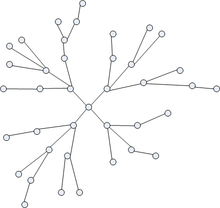This article relies largely or entirely on a single source. (August 2020) |
You can help expand this article with text translated from the corresponding article in French. (August 2013) Click [show] for important translation instructions.
|
In the context of telecommunications, a terminal is a device which ends a telecommunications link and is the point at which a signal enters or leaves a network. Examples of terminal equipment include telephones, fax machines, computer terminals, printers and workstations.

An end instrument is a piece of equipment connected to the wires at the end of a telecommunications link. In telephony, this is usually a telephone connected to a local loop.[1] End instruments that relate to data terminal equipment include printers, computers, barcode readers, automated teller machines (ATMs) and the console ports of routers.[2][3]
See also
editReferences
edit- ^ "Telephony terminal".
- ^ Gnanasivam, P. (2005). Telecommunication switching and networks. New Delhi: New Age International. ISBN 81-224-1583-0. OCLC 762016601.
- ^ P. Gnanasivam (2005). Telecommunication Switching and Networks. New Age International. p. 26. ISBN 978-81-224-1583-4.
External links
edit